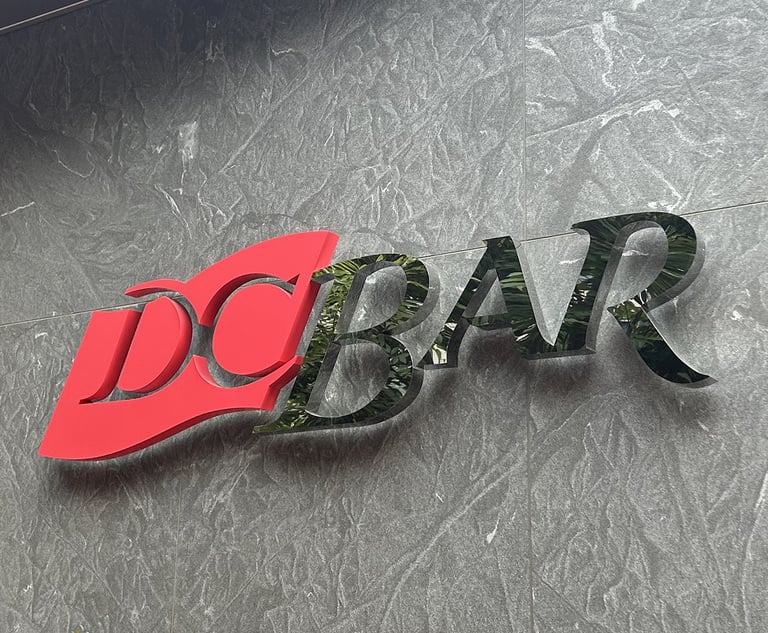DC Circuit Won't Force IRS to Release Trump's Tax Returns
"Confidentiality protections extend to the ordinary taxpayer and the President alike," the D.C. Circuit said in a ruling Tuesday that upheld the dismissal of a suit seeking Trump's tax records.
December 18, 2018 at 10:35 AM
3 minute read
The U.S. Court of Appeals for the D.C. Circuit on Tuesday upheld a ruling dismissing an attempt to overcome IRS privacy rules to acquire President Donald Trump's tax returns through a public-records lawsuit.
The Electronic Privacy Information Center attempted to use a Freedom of Information Act request to get the president's tax returns, which he has withheld citing a pending Internal Revenue Service audit. Legal experts contend nothing prohibits the president from releasing his tax returns.
The panel on Tuesday said all government records are presumed public under FOIA unless specifically exempted. The panel added the Internal Revenue Code specifically exempts individual taxpayers' tax returns. That code was passed after President Richard Nixon attempted to use the IRS to harass political opponents.
“This case presents the question whether a member of the public—here, a nonprofit organization—can use a FOIA request to obtain an unrelated individual's tax records without his consent,” D.C. Circuit Judge Karen LeCraft Henderson wrote for the panel. “With certain limited exceptions—all inapplicable here—the answer is no. No one can demand to inspect another's tax records. And the IRC's confidentiality protections extend to the ordinary taxpayer and the President alike.”
Henderson wrote: “Because EPIC requested only records that are in fact exempt from FOIA, however, we affirm on the merits the dismissal of the three FOIA claims.”
The unanimous panel also included Judges Patricia Millett and Harry Edwards.
Tuesday's decision upheld a ruling from U.S. District Judge James Boasberg in D.C., who tossed the suit after finding EPIC never got consent from Trump, or a congressional committee, for the documents' disclosure.
Read the opinion here in EPIC v. IRS:
Read more:
Donald Trump's Tax Returns Get Their Day in the DC Circuit
DOJ Asks 4th Circuit to Halt State AG Emoluments Lawsuit
Trump Lawyer Emmet Flood's Financial Disclosure Shows $3.3M Partner Share
Charles Rettig, Trump's Pick for IRS Chief, Discloses Clients, Law Firm Salary
This content has been archived. It is available through our partners, LexisNexis® and Bloomberg Law.
To view this content, please continue to their sites.
Not a Lexis Subscriber?
Subscribe Now
Not a Bloomberg Law Subscriber?
Subscribe Now
NOT FOR REPRINT
© 2025 ALM Global, LLC, All Rights Reserved. Request academic re-use from www.copyright.com. All other uses, submit a request to [email protected]. For more information visit Asset & Logo Licensing.
You Might Like
View All
SCOTUSblog Co-Founder Tom Goldstein Misused Law Firm Funds, According to Federal Indictment
2 minute read
'Lack of Independence' or 'Tethered to the Law'? Witnesses Speak on Bondi
4 minute read
DC Bar’s Proposed Anti-Discrimination, Harassment Conduct Rule Sees More Pushback

Full 8th Circuit Hears First Amendment Challenge to School District’s ‘Equity Training’
Trending Stories
- 1'A Death Sentence for TikTok'?: Litigators and Experts Weigh Impact of Potential Ban on Creators and Data Privacy
- 2Bribery Case Against Former Lt. Gov. Brian Benjamin Is Dropped
- 3‘Extremely Disturbing’: AI Firms Face Class Action by ‘Taskers’ Exposed to Traumatic Content
- 4State Appeals Court Revives BraunHagey Lawsuit Alleging $4.2M Unlawful Wire to China
- 5Invoking Trump, AG Bonta Reminds Lawyers of Duties to Noncitizens in Plea Dealing
Who Got The Work
J. Brugh Lower of Gibbons has entered an appearance for industrial equipment supplier Devco Corporation in a pending trademark infringement lawsuit. The suit, accusing the defendant of selling knock-off Graco products, was filed Dec. 18 in New Jersey District Court by Rivkin Radler on behalf of Graco Inc. and Graco Minnesota. The case, assigned to U.S. District Judge Zahid N. Quraishi, is 3:24-cv-11294, Graco Inc. et al v. Devco Corporation.
Who Got The Work
Rebecca Maller-Stein and Kent A. Yalowitz of Arnold & Porter Kaye Scholer have entered their appearances for Hanaco Venture Capital and its executives, Lior Prosor and David Frankel, in a pending securities lawsuit. The action, filed on Dec. 24 in New York Southern District Court by Zell, Aron & Co. on behalf of Goldeneye Advisors, accuses the defendants of negligently and fraudulently managing the plaintiff's $1 million investment. The case, assigned to U.S. District Judge Vernon S. Broderick, is 1:24-cv-09918, Goldeneye Advisors, LLC v. Hanaco Venture Capital, Ltd. et al.
Who Got The Work
Attorneys from A&O Shearman has stepped in as defense counsel for Toronto-Dominion Bank and other defendants in a pending securities class action. The suit, filed Dec. 11 in New York Southern District Court by Bleichmar Fonti & Auld, accuses the defendants of concealing the bank's 'pervasive' deficiencies in regards to its compliance with the Bank Secrecy Act and the quality of its anti-money laundering controls. The case, assigned to U.S. District Judge Arun Subramanian, is 1:24-cv-09445, Gonzalez v. The Toronto-Dominion Bank et al.
Who Got The Work
Crown Castle International, a Pennsylvania company providing shared communications infrastructure, has turned to Luke D. Wolf of Gordon Rees Scully Mansukhani to fend off a pending breach-of-contract lawsuit. The court action, filed Nov. 25 in Michigan Eastern District Court by Hooper Hathaway PC on behalf of The Town Residences LLC, accuses Crown Castle of failing to transfer approximately $30,000 in utility payments from T-Mobile in breach of a roof-top lease and assignment agreement. The case, assigned to U.S. District Judge Susan K. Declercq, is 2:24-cv-13131, The Town Residences LLC v. T-Mobile US, Inc. et al.
Who Got The Work
Wilfred P. Coronato and Daniel M. Schwartz of McCarter & English have stepped in as defense counsel to Electrolux Home Products Inc. in a pending product liability lawsuit. The court action, filed Nov. 26 in New York Eastern District Court by Poulos Lopiccolo PC and Nagel Rice LLP on behalf of David Stern, alleges that the defendant's refrigerators’ drawers and shelving repeatedly break and fall apart within months after purchase. The case, assigned to U.S. District Judge Joan M. Azrack, is 2:24-cv-08204, Stern v. Electrolux Home Products, Inc.
Featured Firms
Law Offices of Gary Martin Hays & Associates, P.C.
(470) 294-1674
Law Offices of Mark E. Salomone
(857) 444-6468
Smith & Hassler
(713) 739-1250










